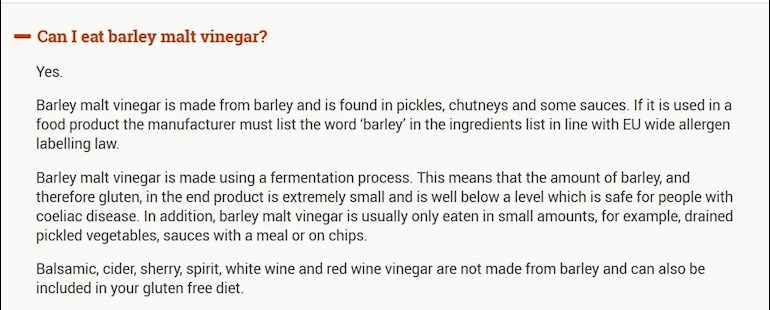Hello All
Is there a definitive answer on Malt Vinegar - i.e. is it or isn't it safe for coeliac?
Our friends at Coeliac UK give the seal of approval in that the amount of gluten will come in well under the 20ppm level after the fermentation/processing of the gluten is complete, and state most people only consume a small amount so, in their words it's ok.
Other sources of information on the suitability of malt vinegar say 'no way' and do not consume.So, for example, this is from 'verywellfit.com':
"Malt vinegar. This is the only vinegar that everyone agrees is strictly off-limits on the gluten-free diet—it's made from barley-based ale that's not distilled, so it definitely contains gluten. Avoid."
Interestingly this website also indicates that white vinegar starts life from barley malt also. Who knew!
So, any thoughts/experiences on this one?
I personally wouldn't touch it with a barge pole, but checking in terms of the cross-contamination risk of production lines where barley malt might be present.
*******************
TO UPDATE (04.11.19)
I've had email back from an independent gluten testing organisation who state they have low confidence in Malt Vinegar being ok after their own tests, and clarify that the testing of this product with ELISA is also dicey.
The FDA (the american equivalent to Food Standards Agency) state it's a no from them on Malt Vinegar also as it is not distilled, but simply fermented. I'm not sure if this is true for all Malt Vinegars, but they advise against them.
But CUK still state that it is fine, and will be passing that information to the food manufacturers that they advise for GF food and products, including restaurants and cafés that have their training. Their statement is attached in the image above.
I spoke to customer services at Sarson's and asked if their Malt Vinegar is GF. They clearly stated that 'no' it isn't. They said they use to assert that, but then changed that assertion in line with legislation. So they are clearly stating their Malt Vinegar is NOT gluten free.
The challenge we have is that malt vinegar may be a source of cross contamination if it's claimed to be GF but not, so either as an undeclared ingredient in a restaurant that believes it to be GF or on same production line as GF products. Just another thing to be aware of.
